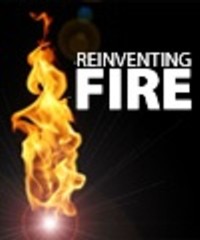Reinventing Fire - New Initiative by RMI
 Energy-related economic, security, and environmental threats
Energy-related economic, security, and environmental threatsare intensifying the national conversation about how to regain
energy leadership and competitiveness, restore jobs and prosperity,
and build a secure and climate-safe energy system.
America lacks a comprehensive vision of how a market economy can achieve these
transformational goals, says the Rocky Mountain Institute (RMI),
one of America’s leading climate-related think tanks.
RMI has that vision, and is now building its detailed roadmap,
which it calls Reinventing Fire(tm). This
target=”_blank”>strategy will bring together
RMI’s 28 years of innovation and engage the world in its most
ambitious and important work yet-using whole-system thinking and
integrative design to move the U.S. off fossil fuels by 2050, led
by business for profit.
“We are engaging powerful partners across four key
sectors-buildings, transportation, industrial design and
electricity-to understand and vault the barriers to shifting from
fossil fuels to efficiency and renewables. Although that transition
will take decades to complete, and not all its details can be fully
foreseen, big gains can start now,” says RMI.
Reinventing Fire will focus on opportunities in the next five
years that can profitably jump-start the journey toward a
fossil-fuel-free economy.
Building on its 2004 synthesis
target=”_blank”>“Winning the Oil Endgame,”
RMI’s goal with Reinventing Fire is to change minds and clarify
choices by showing what exists, what works, what makes sense and
what makes money. “We aim to move the conversation from “it’s
impossible” and “how much will it cost?” to “here’s how” and “how
can we invest?”
Reinventing Fire will not only create a vision but also provide
a peer-reviewed, industry-validated roadmap of practical steps
toward an efficient, resilient, cost-effective, all-renewable
energy system.
Three attributes uniquely equip RMI to lead this work:
- Our whole-system principles are suited to the broad nature and
interactive complexity of the problem. - Mastering the technical, economic and institutional tangle of
energy issues, opportunities and players. - RMI’s convening power and transideological approach will draw
constructive feedback from allies and skeptics, fostering diverse
partnerships for dissemination and implementation.
A Cross-Sector Approach
Paramount in the Reinventing Fire vision is the belief that
transitioning to efficiency and renewables will require an
integrative approach within and between systems, leavened with a
healthy dose of fresh thinking.
Reinventing Fire requires RMI’s strengths-as practitioners, not
theorists; doing solutions, not problems; and doing transformation,
not incrementalism.
In the web of interconnections spanning how energy is produced,
transported, distributed and used, all the points along the way are
fair game for intervention. But decades of research into how energy
moves from fossil-fuel sources to uses have revealed key leverage
points in four sectors: transportation, buildings, industry and
electricity.
Transportation
Moving people, freight and the
platforms that carry them uses most of the world’s
oil. Smart design can make platforms lighter and more efficient
while enhancing performance, safety and comfort. RMI’s
implementation strategy aims to spur mass markets that will induce
manufacturers to retool and redesign all types of vehicles.
Buildings
Despite new codes, design tools, technologies and
early success stories, the U.S. commercial building stock is no
more energy efficient today than it was 25 years ago. In 2030,
approximately 60 percent of the current commercial building stock
will still be in use. Clearly,
target=”_blank”>buildings need to be a major
part of any effort to get the U.S. off fossil fuels. RMI’s
initiative uses integrative design, astute timing and powerful
partners to make these improvements bigger and cheaper.
Industry
Few power and industrial plants, commercial and
residential buildings, vehicles and transportation systems are as
energy efficient as they should be. target=”_blank”>Factor Ten Engineering (10Xe)
aims to revolutionize how engineering is taught and practiced, so
very large energy savings cost less. RMI’s projects have
demonstrated impressive potential to apply such integrative design
across the range of industrial processes, as well as to buildings
and vehicles. We plan to multiply those initial successes into far
wider change, especially in industry.
Electricity
Electricity generation is the largest user of
fossil fuels, chiefly coal. RMI’s
target=”_blank”>energy practice is leading a
multi-year effort to develop a credible and advantageous transition
from fossil fuels to efficiency and renewables. Our
target=”_blank”>Next-Generation Utility
initiative will show that replacing coal and nuclear power with a
portfolio of dynamic demand- and supply-side resources-distributed
and renewable-is both cost-competitive and highly reliable.
Source: www.rmi.org

